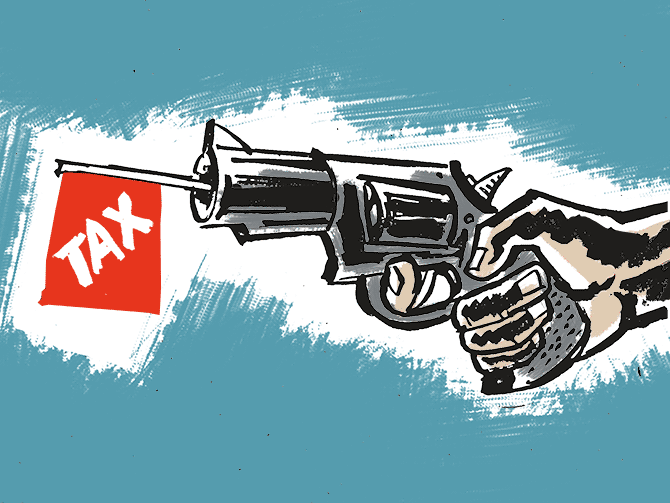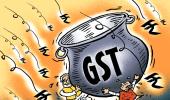Like the UPA government, probably the NDA government also feels that hardships caused to taxpayers are just collateral damage and that taxpayers are too few and even those few don’t have a vote (non-individuals) or don’t vote, says Harsh Roongta.
Illustration: Dominic Xavier/Rediff.com

Union minister, Arun Jaitley, in his avatar as finance minister, had coined the very apt term -- tax terrorism -- in 2014 to describe the last years of the United Progressive Alliance (UPA) government.
The tax department, in those days, twisted every possible arm (without bothering about legality) and brought in retrospective amendments to try and win the Vodafone battle by the back door despite losing in the Supreme Court.
At that time, Jaitley had mentioned that the utter failure to bring new taxpayers into the net had resulted in unreasonable tax demands from existing taxpayers to meet equally unreasonable tax collection targets.
Unfortunately, even under the current government, tax terrorism continues. In fact, it has risen further.
Sample this: A public sector bank was asked to pay up an unjustified double-digit crore tax demand on March 31.
After a lot of hue and cry, the money was refunded in the next month.
Worse still, prosecution notices have become routine for even minor infractions such as delayed payment of tax deductible at source (where it has been ultimately paid with interest for the delayed period) or late filing of income tax return.
Then, there are cases of taxpayers being forced to pay 20 per cent of the disputed demands.
To add insult to injury, the tax department refuses to refund the same even after losing the case in appeal (by the simple expedient of refusing to give effect to the appellate order) or proposes to adjust it against the demand for later years.
In the unkindest cut, the Central Board of Direct Taxes plans to incentivise the commissioner appeals when they enhance the order of assessment already done by another officer.
This is akin to incentivising the district magistrates to not only affirm the sentence requested by the police officials but to go ahead and impose even stricter punishment.
That could cause havoc within the criminal justice system.
The whole emphasis seems three-pronged. One, raise unjustified high-pitched demands and collect 20 per cent of it immediately. Two, delay, deny or defer the legitimate refund due. Three, discourage appeal proceedings.
In the initial days of the National Democratic Alliance (NDA), the government had proposed to form a committee of senior tax officials in every city to review and reverse unjustified high-pitched assessments.
Having checked with leading tax practitioners, it seems that these committees are yet to be set up.
I would be happy to be proven wrong, if the tax department contradicts this with proper facts and figures regarding these so-called committees.
Like the UPA government, probably the NDA government also feels that such hardships caused to taxpayers are just collateral damage and that taxpayers are too few and even those few don’t have a vote (non-individuals) or don’t vote.
But I am sure as 2019 comes near and the investment climate refuses to improve, one of the key reasons will be this unjust and unfair direct taxation system.
Harsh Roongta is a Sebi-registered investment advisor











